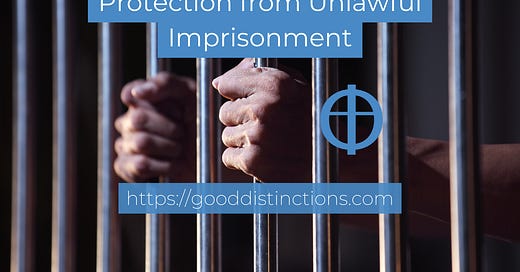Every so often, I like to look at “this day in History” compilations. For today, September 6, there was a story from 2006 about a speech that President Bush made regarding the truth of the existence of CIA prison black sites for terror suspects. Here are three associated articles for those interested:
I am very interested in digging a bit deeper into the topic of interrogation, torture, CIA off-shore black sites, and the like. But today is not that day. It’s way out of my realm of expertise. So, if you all think this would be interesting, I’ll seek out someone who is an expert!
At any rate, like almost anything that one can ponder, these stories led me to thinking about a tangential topic. Namely, I want to look briefly at the topic of the writ of habeas corpus and how grateful I am for the Western Legal Tradition.
In 1215, the Magna Carta was written by barons against the tyrannical overreach of King John of England and it “put into writing the principle that writing the principle that the king and his government was not above the law. It sought to prevent the king from exploiting his power, and placed limits of royal authority by establishing law as a power in itself (U.K. Parliament).”
Among other things, the Magna Carta provided the founding documents of the American system with principles such as “no taxation without representation” and the “right to a fair trial under law.” This right to a fair trial also included a trial by jury. The principle which I want to hone in on today is the forbidding of the suspension of habeas corpus without legal cause.
The Magna Carta guaranteed that all free men would have immunity from illegal imprisonment. This would later be written into Article I, Section 9 of the United States Constitution as: “the privilege of the writ of habeas corpus shall not be suspended, unless when in cases of rebellion or invasion the public safety may require it (U.S. Constitution).”
Habeas corpus in latin means “show me the body” or “you may have the body” and it was the phrase used to bring a prisoner to court. In English History, habeas corpus was suspended in 1793 when their were concerns of rebellion spreading to England from France. It was suspended during the Civil War in the United States (though this was later declared unconstitutional by the Supreme Court in Ex Parte Milligan). Habeas corpus was also suspended during the two world wars.
President Bush, a month after admitting to CIA black sites, signed a law (Military Commissions Act (MCA) of 2006) suspending the right of habeas corpus to persons “determined by the United States” to be an “enemy combatant” in the War on Terror. Again, I am admittedly out of my depth in this conversation. But as an American citizen, I can give my lay opinion. This action seems to me to be understandable but ill-advised. Given that the right to writ of habeas corpus is an American value (enshrined in the Constitution, no less), it should extend to anyone that the United States deals with. It seems to me to be more of a fundamental and universal right, rather than the right of citizens only. Beyond that, it is enshrined in the Magna Carta, and, as such, has a long history in the patrimony of Western culture. It would seem that the Supreme Court agreed, in that it ruled the MCA of 2006 was an unconstitutional suspension of the writ of habeas corpus - but it was a close decision - 5-4 vote (Boumediene v. Bus). On the same token, it was Justice Antonin Scalia’s opinion that the court’s decision “will almost certainly cause more Americans to be killed.” This is an incredibly important reminder that these philosophical debates cannot remain in a purely theoretical realm.
At any rate, if we set aside the extreme cases and conditions, I think we can all agree that gratitude is the proper disposition to the right to the writ of habeas corpus. If I am ever arrested, I am glad that I can expect to be told why! Though, I hope to never be in that position! Nonetheless, the protection from unlawful imprisonment is so fundamental to freedom that it can be said to be a prerequisite for liberty. Being thrown in jail for any reason for an indefinite period of time, and perhaps without a hope of speedy trial by a jury of peers, is a recipe for tyranny. We should be grateful for the Western Legal Tradition and work to defend it!
As I said, if you’d like to hear a conversation episode on the war on terror, imprisonment of terrorists, torture, CIA black sites, and interrogation, please send us an email or leave a reply. I will do my best to find an expert on these matters and pick their brain! Thanks for reading! See you next time!




